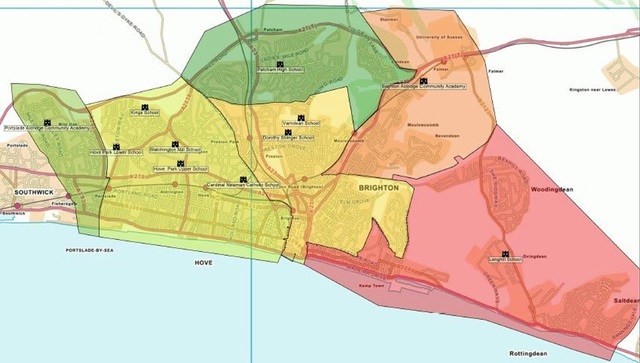Campaigners calling for more equal educational opportunities in Brighton and Hove have welcomed proposals for a public consultation on school admission changes.
Senior councillors are due to hear a deputation from Class Divide at Brighton and Hove City Council’s cabinet on Thursday (5 December) before discussing the proposed admissions changes.
If the cabinet agrees, a consultation will start on adjustments to two catchment areas, the published admission numbers (PAN) at three schools and the admissions criteria when secondary schools are oversubscribed
Class Divide, which was set up to achieve better education for children living in Whitehawk, Manor Farm and the Bristol Estate, has broadly welcomed the proposals going before the cabinet.
Some parents in other parts of Brighton and Hove are concerned that the process is rushed but Class Divide said that the consultation was likely to last for eight weeks rather than the usual six.
The deputation, led by Carlie Goldsmith, is expected to recognise the council’s efforts to tackle a projected 500 surplus places in secondary schools as the falling birthrate feeds through beyond primary schools.
Since 2019, the council has proposed dealing with falling pupil numbers in primary schools by reducing the intake at larger schools and this year the two smallest primary schools in Brighton and Hove closed.
And now, the Roman Catholic Diocese of Arundel and Brighton is consulting parents on closing the smallest of its schools, St Joseph’s Primary, in Hollingdean.
Proposals due to go before the cabinet include moving most of the Whitehawk estate into the catchment areas for Brighton’s most popular secondary schools, Varndean and Dorothy Stringer.
Further changes include allocating 20 per cent of spaces to pupils from single-school catchment areas and reducing admissions at Longhill, Blatchington Mill and Stringer.
Dr Goldsmith said: “What is clear from the data we have is that our current system is failing our poorest children.
“A system designed to meet the needs of children having the hardest time outside of school will be a system that works for all children.
“The measure of our society is how it treats its most vulnerable members.
Change has not happened fast enough for our poorest children. More delay will impact their outcomes the most.”
Class Divide volunteer and podcast creator Curtis James said that schools with high concentrations of disadvantaged children face greater challenges in recruitment, retention and resources.
He said: “The current system has created stark disparities, with some areas of our city having no meaningful choice of schools for years.
“The experiences of families in these communities deserve equal weight in this discussion.”
A group of parents concerned about the data analysis from a three-week survey carried out last month are also due to address the cabinet on Thursday.
According to the meeting papers, Mark Kennedy is leading the group which includes data specialist Adam Dennett
Professor Dennett has raised concerns about the proposals which risk 200 children missing out on catchment area schools.
They are concerned that the council has “been selective” about the data used to create the consultation suggestions.
The group said: “There were strong objections to reducing the size of well-performing schools.
“This suggests a need to ensure published admission numbers (PANs) are aligned with where children live and reflect demand in different parts of the city.
“It also suggests there is not support for increasing numbers at Longhill School by decreasing numbers in schools that are regularly over-subscribed.”
The cabinet is due to meet at Hove Town Hall from 5pm on Thursday 5 December. The meeting is scheduled to be webcast on the council’s website.








